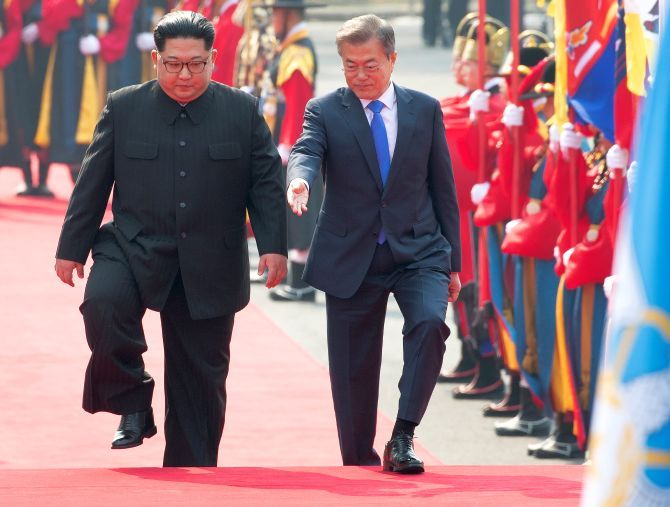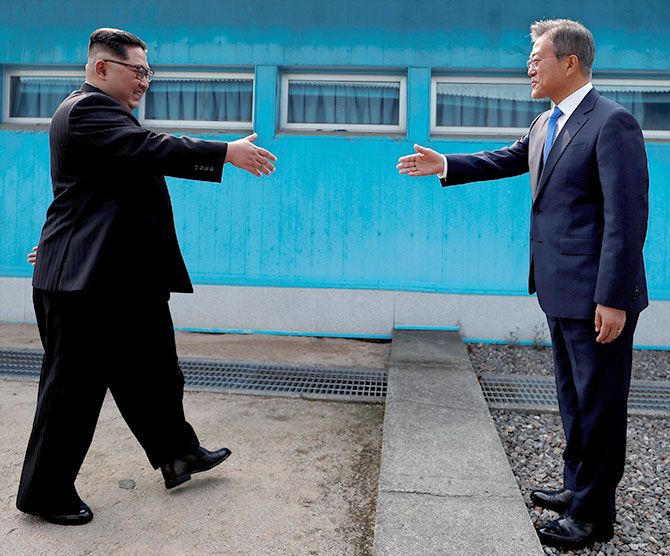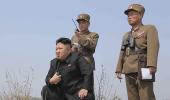'Much depends on Moon's persuasive skill to make both Trump and Kim shed some of their rigidity and be flexible to accommodate contrarian viewpoints,' says Dr Rajaram Panda.

The table seems to have turned towards peace in the past few months after years of escalatory tensions, nuclear tests, missile launches, even to the tune of the spectre of a possible nuclear holocaust.
All these became possible after a liberal assumed the Presidency in South Korea in 2017 with single-minded determination to normalise ties with the North Korean brethren, bury the past and open a new chapter on the Korean peninsula.
Not only did South Korean President Moon Jae-in make it possible for a summit with North Korean leader Kim Jong Un in April, but met a second time to take the dialogue further.
Now widening the opening further of the new era of peace-making in the Korean peninsula, the third inter-Korean summit is scheduled to take place on September 18-20, 2018 at Pyeongyang in North Korea.
This inter-Korean bonhomie set the stage for a summit between US President Donald J Trump and Kim Jong Un on June 12, 2018 in Singapore.
Though there are controversies over the outcome of the Singapore summit on the issue of who conceded how much and on what terms, there is now talk about a possible second Trump-Kim summit soon.
The fact that two unpredictable leaders engaging but with no predictable outcomes on the issue of denuclearising the Korean peninsula itself was a significant development.
Each side made claims that success was achieved, but such assertions proved to be mere will-o-the-wisp, at least for now.
Suggestions even surfaced that the sole credit ought to go to Trump to make him a suitable candidate for a Nobel Peace Prize.
The truism, however, is that if at all a Nobel Prize is to be awarded on the peace initiatives, Moon Jae-in is a more suitable candidate to deserve such honour, not Trump.
So, what can one expect from a third Moon-Kim summit on September 18-20?
Standing committed to his resolve to solve the Korean peninsula issue, Moon urged North Korea and the US to 'make bold decisions' ahead of the summit with Kim to break a deepening diplomatic impasse over the North's nuclear ambitions, offering himself to be the negotiator.
The fact remains that Moon is striving hard and is committed to achieve denuclearisation and peace on the Korean peninsula and expects his summit with Kim this week leading to another 'big step' towards denuclearisation.
Coming at a crucial moment in the overall diplomacy that is stuck amid recriminations between Washington and Pyongyang on how to follow through on vows made at the summit in Singapore, the significance of Moon's resolve to realise his aim of riding the North of its nuclear weapons may not be lost sight of.
Dismantling North Korea's nuclear arsenal is Trump's sole objective and he seems determined to achieve this before his term ends. Such a stance is laudable, but the path to achieve this is not simple, if not perilous.
As the main negotiator behind the scenes, Moon expects that while Pyongyang carries out dismantling of its nuclear installation, Washington must take a 'corresponding step', which will facilitate removal of the deep-rooted mutual distrust accumulated during 70 years of hostile relations.

Though Pyongyang has dismantled its nuclear and rocket engine testing sites following the Moon-Kim and Trump-Kim summits, Washington demands more serious steps which irks Pyongyang.
Moon has noted that Kim has demanded that his efforts must be reciprocated by corresponding US measures such as a joint declaration to end the 1950-1953 Korean War.
Moon's expectations of 'genuine talks' between Trump and Kim look achievable with the news that a second Trump-Kim summit is likely soon.
Steve Biegun, the new US special envoy on North Korea, stressed the need to maintain nuclear diplomacy during his meeting with South Korean envoy Lee Do-hoon.
That Moon has faith in Trump is tremendous news if the commitment for a nuclear-free Korean peninsula remains on track.
Kim reportedly sent Trump a request for a second meeting to follow up their June summit and the credit for this must go to Moon for his perseverance to achieve the objective.
It remains unclear though if the deadlocked nuclear diplomacy is near resolution.
At the June summit, Kim made vague disarmament pledges without revealing a detailed road map or timetable for his denuclearisation process which gave room for analysts to say the promises were pompous bereft of any seriousness.
While interacting with the media in New Delhi on September 13 which I attended, South Korea's Ambassador to India Shin Bongkil observed that the Panmunjom declaration is being implemented in letter and spirit by both Koreas.
In particular, the ambassador mentioned the significance of both sides pushing to open a liaison office at a North Korean border city as part of cooperation between the rivals ahead of the summit.
Both sides also held military talks to ease tensions along the border such as disarming a jointly controlled area at Panmunjom, removing front-line guard posts and conducting joint searches for soldiers missing from the Korean War.
Ways to build mutual trust and prevent armed clashes between the two militaries is now a priority for both Koreas.
Ambassador Shin was also euphoric that Pyongyang did not display any long range missiles at its recent military parade and focused on conventional arms, peace and economic development as it marked the 70th anniversary of North Korea's founding.
Though the reduced weapons display compared to the past three years pleased Trump who hailed it as a 'big and very positive statement from North Korea' and its 'commitment to denuclearise' based on the announcement made during the Singapore summit, Kim expects that the US takes corresponding steps to promote the political resolution process for the peninsula issue.
Notwithstanding the exuberance of such optimism, doubts remain about the ways to end the North's development of nuclear weapons and ballistic missiles programmes.
When the dates for the third Kim-Moon summit were announced, speculations abound if some headway could be expected on a possible peace declaration and cooperation on joint economic and infrastructure projects.
It remains doubtful if the trust deficit between the two Koreas has been bridged as opinions differ on who gained or conceded how much as there was lack of transparency in the discussions.
Pyongyang is yet to agree to a timeline for eliminating its nuclear arsenal or to disclose its size, which the US estimates have put at between 30 and 60 warheads.
An ever optimistic Moon is likely to visit Washington, as Ambassador Shin informed us on Thursday, to brief Trump after what transpired during his summit with Kim and plan the next step.
Earlier, Ri Son Gwon, chairman of a North Korean committee aiming for the 'peaceful reunification' of the peninsula, told his counterpart, Unification Minister Cho Myoung-gyon: 'If the issues raised at the talks aren't resolved, unexpected problems could emerge and the issues that are already on the schedule may face difficulties.'
If one reads the statement carefully, it is clear that it is not easy to arrive at a consensus to resolve the denuclearisation issue quickly.
Besides the denuclearisation issue which is top of the table, there are some bilateral issues that could confront Moon and Kim at the September 18 to 20 summit.
North Korea is angry with South Korea's alleged complicity in receiving a dozen North Korean restaurant workers who defected via China in 2016. Pyongyang alleges these North Koreans were abducted by the South and therefore should be returned.
This case could create obstacles to the reunion of families divided by the 1950-1953 Korean War.
Though both sides expressed their commitment to resolve the issue on humanitarian issue and/or for the development of inter-Korean relations, the truism is that the issue is complicated.
Another intricate issue that Moon and Kim face is how to go forward with their commitment agreed at their first summit in April to declare an end to the Korean War together with the US.
Washington says this is only possible after the North abandons its nuclear programme.
Moon has other ideas to help the North, but faces hurdles.
South Korea hopes to restart efforts on a cross-peninsula railway and a joint industrial park in Kaesong. but is cautious about major projects due to international sanctions chiefly engineered by Washington over the North's nuclear and missile programmes.
Washington's inflexible position restrains Moon to do what he desires to improve relations with the North.
Pyongyang appreciates Moon's dilemma and blames Washington for continuing with the sanctions despite its goodwill gestures -- a moratorium on nuclear and missile tests, dismantling a nuclear site and returning the remains of US soldiers in the Korean War.
Kim expects Moon to bridge US expectations to speed up progress in officially declaring an end to the war.
According to Christopher Green, a senior advisor at the International Crisis Group, Kim is expected to increase pressure on the South to deliver on economic promises made at the April summit besides persuading Trump to ease sanctions.
Though one need not be entirely pessimistic about a possible outcome from the third Moon-Kim summit, there is no reason for despair either.
Given that the issues on the table are too complicated, there could be several summits and back channel diplomacy in the coming months to address them.
What one can expect is some incremental outcome. Much depends on Moon's persuasive skill to make Trump and Kim shed some of their rigidity and be flexible to accommodate contrarian viewpoints.
That could create a win-win situation and be in the long term interests of not only both the Koreas, but also for security of the region and the world.
Dr Rajaram Panda, former Senior Fellow at the IDSA and until recently ICCR Chair Professor at Reitaku University, Japan, is at present a Lok Sabha Research Fellow.










